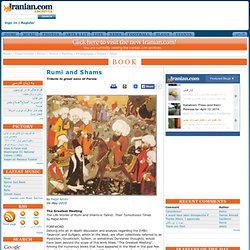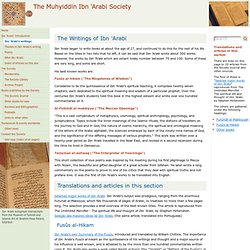

Mevlana Celaleddin Rumi, the great Anatolian philosopher and the father of the Mevlevi sect. Rumi Nine. Nine omeone said: “A man came who wanted to see you.

He kept saying, ‘I wish I could have seen the Master. " Rumi said: He does not see the Master at this moment because in truth the desire that filled him, namely to see the Master, was a veil hiding the Master. So it is with all desires and affections, all loves and fondnesses that people have for every variety of thing - father, mother, heaven, earth, gardens, palaces, knowledge, things to eat and drink. The lover of God realizes all these desires are truly the desire for God, and they are all veils covering humanity’s eyes. It is not God’s way to answer every problem separately, but with one answer all questions are satisfied. God has created these veils for a good purpose. Look at the sun. When God reveals Itself through a veil to the mountain, those slopes become fully arrayed in trees and flowers and verdure.
Someone asked: “Well, isn’t this the same sun in the winter?” Rumi answered: Our purpose here was to draw a comparison. Books. Greetings ParkSurfer!

Hope you enjoyed the stories, poems, and writing here. If you are interested in reading further here are some Zen, Sufi, Poetry, and related books I recommend... A Book Of Wisdom And Lies - Sulkhan-Saba Orbeliani - translated by Katharine Vivian Avicenna And The Visionary Recital - Henry Corbin Holy Fire: Nine Visionary Poets And The Quest For Enlightenment - edited by Daniel Halpern Ibn Al'Arabi: The Bezels Of Wisdom - translated by R.W.J. Austin Memoirs Of Saints - Fariduddin Attar - translated by Bankey Behari Muslim Saints And Mystics - Farid Al-Din Attar - translated by A.J. Arberry Mysticism: A Study And An Anthology - F.C. Feel free to email your recommendations to be added here. top.
Funny Works: Mullah Nasruddin. Mullah Nasruddin The name that every Afghan remembers hearing about in childhood.

Here is few of the thousands of humurous and thoughtful stories about Him. His identity is being claimed by three countries. Afghanistan, Iran and Turkey. Page 1 of 2 A neighbor who Nasruddin didn't like very much came over to his compound one day. The neighbor was disappointed. Just as he got a few steps away, Mullah Nasruddin's donkey, which was in the back of his compound all the time, let out a big bray.
The neighbor turned to Nasruddin and said, "Mullah Sahib, I thought you told me that your donkey was not here. Mullah Nasruddin turned to the neighbor and said, "My friend, who are you going to believe? One day Nasruddin repaired tiles on the roof of his house. . - What do you want? - Come down, replied stranger So I can tell it. Nasruddin unwilling and slowly climbed down the ladder. - Well! - Could you give little money to this poor old man? Sirr al-Asrar TOC. Rumi and Shams. The Greatest MeetingThe Life Stories of Rumi and Shams-e Tabrizi: Their Tumultuous Times by Majid Amini FOREWORD Delving into an in-depth discussion and analysis regarding the Erfân, Tasavvof, and Sufigary, which in the West, are often collectively referred to as Mysticism, Gnosticism, Sufism, or sometimes Dervishes’ thoughts, would have been beyond the scope of this work titled, “The Greatest Meeting”.

Among the numerous books that have appeared in the West in the past few decades (mostly inept translations of Rumi’s poetry, or a few scholarly works on his life and time), it is challenging if not impossible to find a clear and convincing definition for these schools of thought. Even if there has been any sporadic attempt to define Mysticism, these efforts are vague, abstract, or expressed in language in which their meaning cannot be easily discerned from the context of the subjects that were not clearly defined by the founders of this thought in the first place. The works of Muhyiddin Ibn 'Arabi - translations from and introductions to many titles. The Writings of Ibn 'Arabi Ibn 'Arabi began to write books at about the age of 27, and continued to do this for the rest of his life.

Based on the titles in two lists that he left, it can be said that Ibn 'Arabi wrote about 300 works. However, the works by Ibn 'Arabi which are extant today number between 75 and 100. Some of these are very long, and some are short. His best known works are: Fusûs al-hikam ("The Ringstones of Wisdom") Considered to be the quintessence of Ibn 'Arabi's spiritual teaching, it comprises twenty-seven chapters, each dedicated to the spiritual meaning and wisdom of a particular prophet.